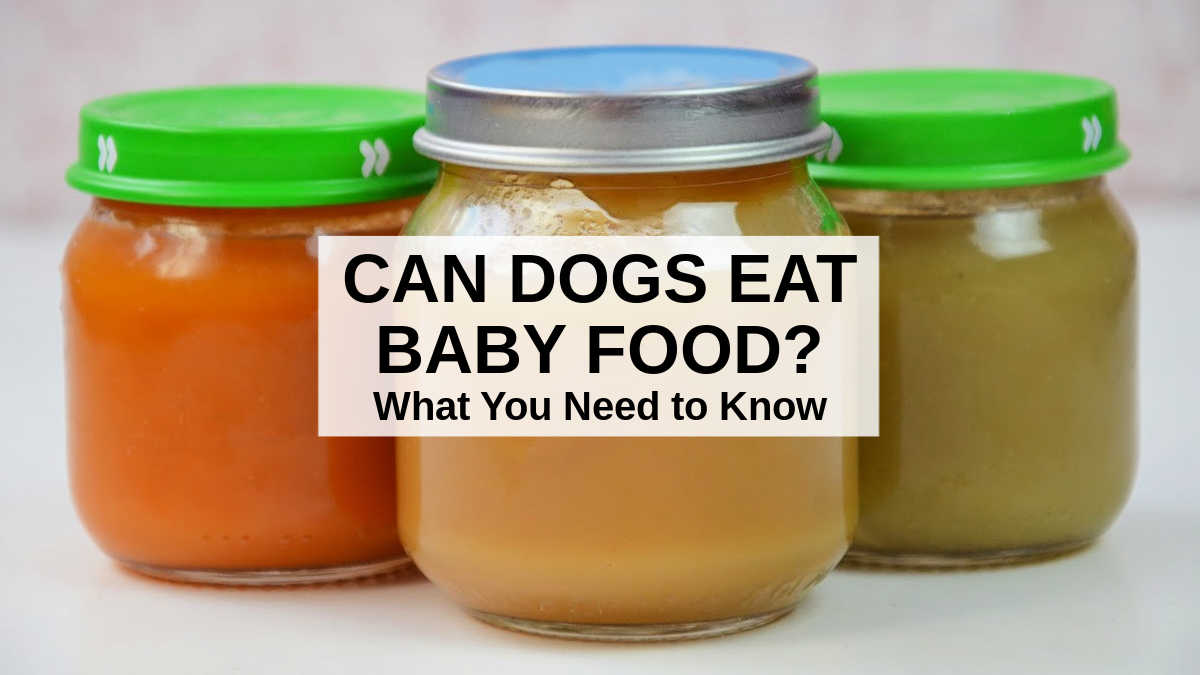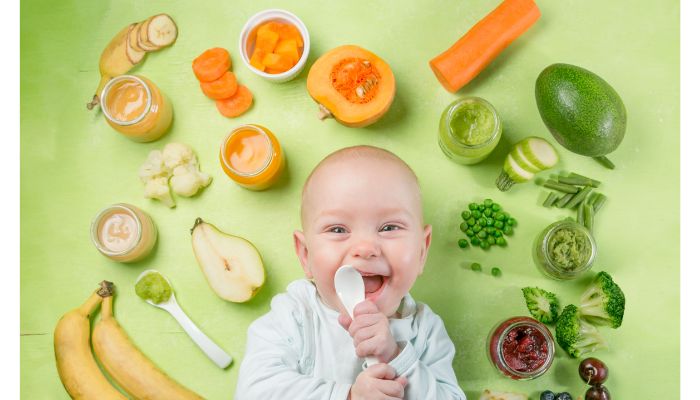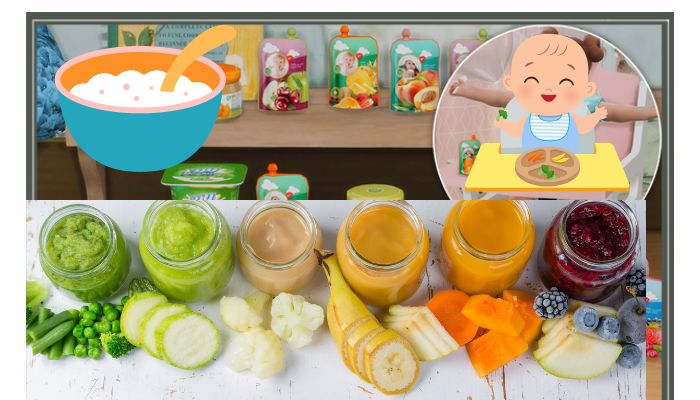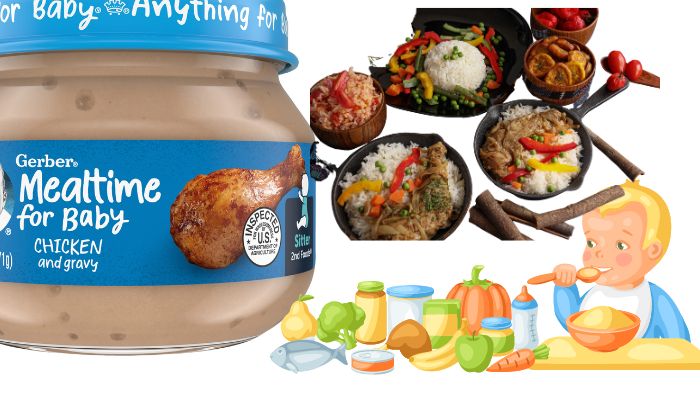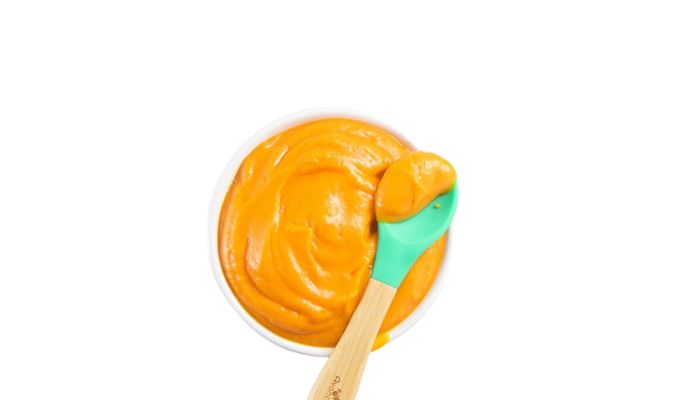When it comes to our furry friends, we want to make sure they eat the right things. So, can dogs eat baby food? Let’s explore this topic in more detail and find out what’s safe and what’s not.
Feeding our dogs can be quite the task, especially when it comes to figuring out what’s appropriate for their diet. It’s not uncommon for dog owners to wonder if baby food is a good option for their four-legged companions.
So, whether you’re a dog lover or just curious about their dietary needs, let’s dive into the world of dogs and baby food to see if it’s a match made in heaven or if it’s best left off their menu.
While baby food is safe for dogs to eat in moderation, it’s important to choose the right type. Look for baby food without any added sugars, spices, or artificial ingredients. Opt for plain meat or vegetable purees without any seasoning. You can mix it with your dog’s regular food or use it as a treat or topper. Remember, baby food should never replace a balanced diet formulated for dogs. Consult your veterinarian for specific recommendations.
Can Dogs Eat Baby Food: Exploring the Pros and Cons
Baby food is a convenient and nutritious option for our little ones, but what about our furry friends? Can dogs eat baby food? It’s a question that many pet owners have asked, and the answer isn’t as straightforward as you might think. In this article, we’ll delve into the pros and cons of feeding baby food to dogs, exploring the benefits, potential risks, and important considerations to keep in mind. So, let’s dive in and find out if baby food is a suitable option for our canine companions.
The Benefits of Feeding Baby Food to Dogs
While dogs have specific dietary needs that differ from humans, baby food can have some benefits when used in moderation. Here are a few potential advantages:
- Easy Digestion: Baby food is often formulated to be easily digestible, which can be beneficial for dogs with sensitive stomachs or digestive issues.
- Nutrient Content: Certain baby food varieties contain a range of essential nutrients that dogs need, such as vitamins, minerals, and proteins.
- Texture: Baby food is typically smooth and pureed, which can be helpful for older dogs or those with dental issues that struggle with chewing harder foods.
While these benefits sound promising, it’s important to remember that baby food should only be used as an occasional treat or supplement to a well-balanced dog food diet.
The Potential Risks of Feeding Baby Food to Dogs
Although baby food can offer some benefits, there are also potential risks to be aware of when feeding it to dogs. Here are a few key considerations:
- Nutritional Imbalances: Baby food is not formulated to meet the specific nutritional needs of dogs, which means it may lack certain essential nutrients or contain ingredients that are harmful to our four-legged friends.
- High Sugar Content: Some baby food varieties contain added sugars, which can lead to weight gain, tooth decay, and other health issues in dogs.
- Hidden Ingredients: Baby food often contains seasonings, additives, or even small amounts of onion or garlic, which can be toxic to dogs if consumed in larger quantities.
It’s crucial to read the labels carefully and choose baby food varieties that are free from harmful additives or ingredients that can pose a risk to your dog’s health.
Tips for Feeding Baby Food to Dogs Safely
If you decide to incorporate baby food into your dog’s diet, here are a few guidelines to ensure their safety and well-being:
- Consult Your Vet: Before introducing baby food to your dog, consult with your veterinarian to ensure it aligns with their specific dietary needs and health conditions.
- Choose the Right Varieties: Opt for baby food that is free from added sugars, seasonings, or any ingredients that can be toxic to dogs.
- Moderation is Key: Baby food should never replace a balanced and complete dog food diet. Use it sparingly as a treat or supplement to their regular meals.
- Monitor for Any Adverse Reactions: When introducing any new food to your dog’s diet, keep a close eye on them for any signs of digestive upset or allergic reactions. If any issues arise, discontinue feeding them baby food.
Remember, your dog’s health and well-being should always be the top priority. If you have any doubts or concerns, consult with your veterinarian for personalized advice.
Conclusion: Choosing the Best Diet for Your Dog
While baby food can provide certain benefits for dogs, it’s important to approach it with caution and in moderation. Feeding baby food should never replace a well-balanced and nutritious dog food diet specifically formulated to meet their unique nutritional needs. If you’re considering incorporating baby food into your dog’s diet, consult with your veterinarian to ensure it aligns with their individual dietary requirements and health conditions. By making informed decisions and prioritizing your dog’s health, you can provide them with the best diet for their overall well-being.
Key Takeaways: Can Dogs Eat Baby Food?
- Dogs can eat baby food in moderation, but not as a long-term diet.
- Make sure to choose baby food without any harmful ingredients like onion or garlic.
- Check for any added sugars or artificial preservatives that may be harmful to dogs.
- Consult with your veterinarian before feeding your dog baby food to ensure it meets their nutritional needs.
- Homemade dog food is generally a better option than baby food as it can be tailored specifically to your dog’s needs.
Frequently Asked Questions
Welcome to our FAQ section on whether or not dogs can eat baby food. If you’ve ever wondered about feeding your furry friend baby food, you’re in the right place. Below are some commonly asked questions about this topic, along with detailed answers to help you make the best decisions for your dog’s health and well-being.
1. Is it safe for dogs to eat baby food?
While some baby foods may be safe for dogs in small amounts, it’s important to read the labels carefully. Many baby foods contain ingredients that could be harmful to dogs, such as onions and garlic, which can be toxic to them. Additionally, some baby foods may contain excessive amounts of sugar, salt, or artificial additives that are not suitable for a dog’s diet. It’s always best to consult with your veterinarian before feeding baby food to your dog.
If your dog has specific dietary needs or health issues, the vet can provide guidance on suitable alternatives or recommend specific baby food brands that are safe for your furry friend to consume.
2. Can dogs eat baby food as a regular part of their diet?
While baby food may be okay in small amounts as an occasional treat, it should not be a regular part of your dog’s diet. Baby food is formulated for the nutritional needs of babies and may not provide all the necessary nutrients dogs require. A well-balanced dog food specifically designed for dogs is the best way to ensure they’re getting all the nutrients they need to stay healthy.
If you’re considering incorporating baby food into your dog’s diet due to picky eating habits, it’s advisable to explore other options, such as mixing in safe fruits or vegetables that are dog-friendly and approved by your veterinarian. They can guide you on appropriate additions to your dog’s diet.
3. Are there any baby food ingredients that are safe for dogs?
Some baby food ingredients are safe for dogs. Plain, unsalted, and preservative-free baby foods that contain dog-friendly fruits and vegetables like sweet potatoes, peas, carrots, and bananas can be safe options in moderation. However, it’s crucial to read the labels and ensure there are no harmful ingredients or additives.
Remember that moderation is key when it comes to feeding baby food to your dog. It should never replace a balanced dog food diet and should be given as an occasional treat or to supplement their regular meals under the guidance of your veterinarian.
4. Why should I consult my vet before feeding baby food to my dog?
Your veterinarian is the best source of advice when it comes to your dog’s diet and nutritional needs. They can evaluate your dog’s specific health condition, age, weight, and dietary requirements to determine if baby food is safe for your furry friend to consume. They can also recommend alternative options or specific baby food brands that meet the nutritional needs of your dog, ensuring their overall well-being.
Consulting with your vet before introducing baby food to your dog’s diet helps to avoid any potential risks or complications that may arise from inappropriate or unsuitable food choices for your pet.
5. What are the potential risks of feeding baby food to dogs?
Feeding the wrong baby food to dogs can pose several risks. Some baby foods may contain toxic ingredients, such as onions, garlic, or artificial sweeteners, which can be extremely harmful to dogs and may even lead to serious health complications. Additionally, excessive amounts of sugar, salt, or artificial additives found in certain baby foods can negatively impact a dog’s health.
Another risk is that baby food may not provide the complete and balanced nutrition that dogs need. Relying solely on baby food can result in nutrient deficiencies or imbalances. Therefore, it’s essential to consult your veterinarian and choose appropriate food options that meet your dog’s nutritional requirements while minimizing potential risks.
Can Dogs Eat Baby Food?
Summary
So, can dogs eat baby food? It depends. While some baby foods like plain pureed vegetables or fruits can be safe for dogs to eat as an occasional treat, others may contain ingredients that are harmful to dogs. It’s important to read the labels, avoid foods with onion, garlic, or added sugars, and consult with your veterinarian before giving baby food to your furry friend. Remember, a balanced and appropriate diet is key to keeping your dog healthy and happy.

